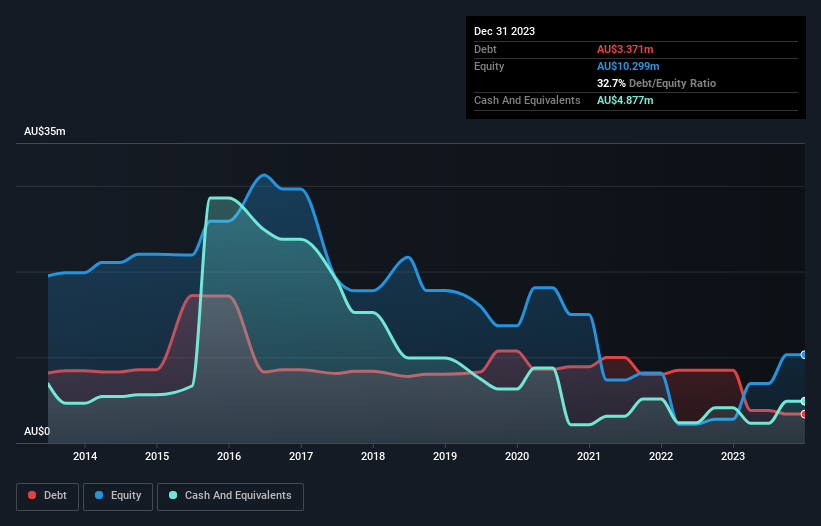Stock Analysis

Warren Buffett famously said, 'Volatility is far from synonymous with risk.' So it might be obvious that you need to consider debt, when you think about how risky any given stock is, because too much debt can sink a company. We can see that Orbital Corporation Limited (ASX:OEC) does use debt in its business. But the real question is whether this debt is making the company risky.
What Risk Does Debt Bring?
Debt is a tool to help businesses grow, but if a business is incapable of paying off its lenders, then it exists at their mercy. In the worst case scenario, a company can go bankrupt if it cannot pay its creditors. However, a more common (but still painful) scenario is that it has to raise new equity capital at a low price, thus permanently diluting shareholders. By replacing dilution, though, debt can be an extremely good tool for businesses that need capital to invest in growth at high rates of return. The first thing to do when considering how much debt a business uses is to look at its cash and debt together.
See our latest analysis for Orbital
What Is Orbital's Debt?
The image below, which you can click on for greater detail, shows that Orbital had debt of AU$3.37m at the end of December 2023, a reduction from AU$8.49m over a year. However, its balance sheet shows it holds AU$4.88m in cash, so it actually has AU$1.51m net cash.

A Look At Orbital's Liabilities
The latest balance sheet data shows that Orbital had liabilities of AU$9.34m due within a year, and liabilities of AU$3.36m falling due after that. On the other hand, it had cash of AU$4.88m and AU$4.07m worth of receivables due within a year. So it has liabilities totalling AU$3.75m more than its cash and near-term receivables, combined.
Of course, Orbital has a market capitalization of AU$19.7m, so these liabilities are probably manageable. However, we do think it is worth keeping an eye on its balance sheet strength, as it may change over time. While it does have liabilities worth noting, Orbital also has more cash than debt, so we're pretty confident it can manage its debt safely. There's no doubt that we learn most about debt from the balance sheet. But it is Orbital's earnings that will influence how the balance sheet holds up in the future. So when considering debt, it's definitely worth looking at the earnings trend. Click here for an interactive snapshot.
Over 12 months, Orbital made a loss at the EBIT level, and saw its revenue drop to AU$13m, which is a fall of 36%. That makes us nervous, to say the least.
So How Risky Is Orbital?
Although Orbital had an earnings before interest and tax (EBIT) loss over the last twelve months, it made a statutory profit of AU$1.4m. So when you consider it has net cash, along with the statutory profit, the stock probably isn't as risky as it might seem, at least in the short term. With revenue growth uninspiring, we'd really need to see some positive EBIT before mustering much enthusiasm for this business. There's no doubt that we learn most about debt from the balance sheet. But ultimately, every company can contain risks that exist outside of the balance sheet. For example Orbital has 4 warning signs (and 1 which shouldn't be ignored) we think you should know about.
When all is said and done, sometimes its easier to focus on companies that don't even need debt. Readers can access a list of growth stocks with zero net debt 100% free, right now.
Valuation is complex, but we're helping make it simple.
Find out whether Orbital is potentially over or undervalued by checking out our comprehensive analysis, which includes fair value estimates, risks and warnings, dividends, insider transactions and financial health.
View the Free AnalysisHave feedback on this article? Concerned about the content? Get in touch with us directly. Alternatively, email editorial-team (at) simplywallst.com.
This article by Simply Wall St is general in nature. We provide commentary based on historical data and analyst forecasts only using an unbiased methodology and our articles are not intended to be financial advice. It does not constitute a recommendation to buy or sell any stock, and does not take account of your objectives, or your financial situation. We aim to bring you long-term focused analysis driven by fundamental data. Note that our analysis may not factor in the latest price-sensitive company announcements or qualitative material. Simply Wall St has no position in any stocks mentioned.
About ASX:OEC
Orbital
Orbital Corporation Limited provides integrated propulsion systems and flight critical components for tactical unmanned aerial vehicles in Australia and the United States.
Adequate balance sheet and slightly overvalued.

